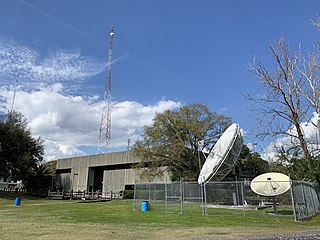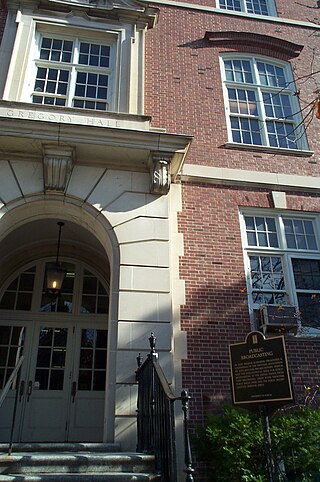Related Research Articles

The Corporation for Public Broadcasting (CPB) is an American publicly funded non-profit corporation, created in 1967 to promote and help support public broadcasting. The corporation's mission is to ensure universal access to non-commercial, high-quality content and telecommunications services. It does so by distributing more than 70 percent of its funding to more than 1,400 locally owned public radio and television stations.

Georgia Public Broadcasting (GPB) is a state network of PBS member television stations and NPR member radio stations serving the U.S. state of Georgia. It is operated by the Georgia Public Telecommunications Commission, an agency of the Georgia state government which holds the licenses for most of the PBS and NPR member stations licensed in the state. The broadcast signals of the nine television stations and 19 radio stations cover almost all of the state, as well as parts of Alabama, Florida, North Carolina, South Carolina and Tennessee.

WJCT, Inc. is a non-profit public media organization in Jacksonville, Florida, United States. It operates PBS member television station WJCT "Jax PBS" and NPR member radio station WJCT-FM 89.9, as well as their associated digital platforms. The company's studios and offices are located on Festival Park Avenue in the Stadium District in downtown Jacksonville.
WEDU is a PBS member television station licensed to Tampa, Florida, United States, serving the Tampa Bay area. It is owned by Florida West Coast Public Broadcasting alongside WEDQ. The two stations share studios on North Boulevard in Tampa and transmitter facilities in Riverview, Florida.
WFSU-TV is a PBS member television station in Tallahassee, Florida, United States. It is owned by Florida State University alongside NPR members WFSU-FM (88.9) and WFSQ. The three stations share studios at the Public Broadcast Center on the Florida State campus; WFSU-TV's transmitter is located near Bloxham, Florida.

WILL-TV is a PBS member television station licensed to Urbana, Illinois, United States, serving the Central Illinois region. Owned by the University of Illinois Urbana-Champaign as part of Illinois Public Media, it is sister to NPR member stations WILL and WILL-FM (90.9). The three stations share studios at Campbell Hall for Public Telecommunication on the university's campus; WILL-TV's transmitter is located on East 1700th Road North, five miles (8 km) west of Monticello.
The Oklahoma Educational Television Authority (OETA) is a state network of PBS member television stations serving the U.S. state of Oklahoma. The authority operates as a statutory corporation that holds the licenses for all of the PBS stations operating in the state; it is managed by an independent board of gubernatorial appointees, and university and education officials, which is linked to the executive branch of the Oklahoma state government through the Secretary of Education.

The Public Broadcasting Act of 1967 issued the congressional corporate charter for the Corporation for Public Broadcasting (CPB), a private nonprofit corporation funded by taxpayers to disburse grants to public broadcasters in the United States, and eventually established the Public Broadcasting Service (PBS) and National Public Radio (NPR). The act was supported by many prominent Americans, including Fred Rogers, NPR founder and creator of All Things Considered Robert Conley, and Senator John O. Pastore of Rhode Island, then chairman of the Senate Subcommittee on Communications, during House and United States Senate hearings in 1967.
WDSC-TV is an independent non-commercial educational television station licensed to New Smyrna Beach, Florida, United States, serving the Orlando area. Owned by Daytona State College, the station maintains studios at the Center for Educational Telecommunications on the DSC campus in Daytona Beach, and its transmitter is located on Brown Road near Christmas, Florida.
Nebraska Public Media, formerly Nebraska Educational Telecommunications (NET), is a state network of public radio and television stations in the U.S. state of Nebraska. It is operated by the Nebraska Educational Telecommunications Commission (NETC). The television stations are all members of the Public Broadcasting Service (PBS), while the radio stations are members of National Public Radio (NPR).

The Florida Channel is a government-access television network operated by Florida State University's WFSU-TV and the Florida State Legislature. The channel is currently carried by 46 cable TV systems throughout the State of Florida either on a part-time or full-time basis as well as through up to 18 live Internet streams and via satellite. The station operates 24 hours a day though its normal broadcast schedule starts at 6:00 a.m. ET and ends at 6:00 p.m. ET with the day's programming repeated in a loop throughout the night. The Florida Channel also airs on the digital subchannels of most Florida PBS member stations and on some public independent and local cable-only stations.

WJCT, branded Jax PBS, is a PBS member television station in Jacksonville, Florida, United States. It is owned by WJCT, Inc., alongside NPR member WJCT-FM (89.9). The two outlets share studios on Festival Park Avenue in Downtown Jacksonville's Stadium District; the TV station's transmitter is located on Hogan Road in the city's Killarney Shores section.

WLRN-FM is a class C1 FM station on 91.3 MHz, and is the main public radio station for South Florida and the Keys based in Miami. The station is owned by the Miami-Dade County Public Schools and is the area's flagship NPR member station, therefore carries Morning Edition, All Things Considered, Weekend Edition, and Wait Wait...Don't Tell Me!. It is also affiliated with Public Radio International and carries The Takeaway and The World, among others. It airs its own locally-produced music programs Evenin' Jazz with Tracy Fields on weeknights, and Night Train on Sundays, before being taken over by the BBC World Service during the overnights.
WEDQ is a secondary PBS member television station licensed to Tampa, Florida, United States, serving the Tampa Bay area. Owned by Florida West Coast Public Broadcasting, it is a sister station to primary PBS member WEDU. The two stations share studios on North Boulevard in Tampa and transmitter facilities in Riverview, Florida.

WFSU is the callsign for public radio stations operated by Florida State University in Tallahassee, Florida.

WRUF-LD is a low-power independent television station in Gainesville, Florida, United States. It is owned by the University of Florida alongside PBS member WUFT, NPR member WUFT-FM (89.1), and commercial radio stations WRUF and WRUF-FM (103.7). The five stations share studios at Weimer Hall on the University's campus; WRUF-LD's transmitter is located on Northwest 53rd Avenue in Gainesville.
The Wisconsin Educational Communications Board (ECB) is a Wisconsin state agency that plans, develops, constructs and operates statewide public radio, public television, public safety, and educational telecommunication systems and programs, and oversees over 60 FCC-licensed broadcast and support stations.
Jacksonville, Florida is served by local media, as well as regional and national media. As of 2017, Jacksonville is ranked as the 42nd largest television media market in the United States, with 700,890 homes. Radio and television broadcasts are governed by the FCC.

The Public Broadcasting Service (PBS) is an American public broadcaster and non-commercial, free-to-air television network based in Crystal City, Virginia. PBS is a publicly funded nonprofit organization and the most prominent provider of educational programs to public television stations in the United States, distributing shows such as Frontline, Nova, PBS NewsHour, Masterpiece, Sesame Street, and This Old House.

In the United States, other than a few direct services, public broadcasting is almost entirely decentralized and is not operated by the government, but does receive some government support.
References
- 1 2 "Florida Public Media | the Association of Public Media in Florida".
- ↑ "PBPB | Public Broadcasting PolicyBase". Archived from the original on 2011-09-30. Retrieved 2011-07-16.
- 1 2 3 "Archived copy" (PDF). Archived from the original (PDF) on 2010-12-05. Retrieved 2011-07-16.
{{cite web}}: CS1 maint: archived copy as title (link) - 1 2 David J. LeRoy; C. Edward Wotring; Jack Lyle (September 1974). ""Today in the Legislature" A Florida Story - Journal of Communication. Volume 24, Issue 3". Journal of Communication. 24 (3). Wiley Online Library: 92–98. doi:10.1111/j.1460-2466.1974.tb00395.x.
- ↑ David C. LeRoy; C. Edward Wotring (1974). "Reaction and Evaluation of "Today in the Legislature" by Legislators, Capital Press and the Public". National Library of Australia. Retrieved June 19, 2019.
- ↑ American Bar Association (December 1974). ABA Journal. American Bar Association. p. 1585.
- ↑ http://www.americanradiohistory.com/Archive-BC-IDX/74-OCR/1974-08-19-BC-0068.pdf [ dead link ]
- ↑ "Sarasota Herald-Tribune – Google News Archive Search".
- ↑ "(Obituary) John Patrick Leu". Tallahassee Democrat . February 18, 2008. Retrieved June 19, 2019.
- ↑ "(Obituary) Elliott C. Mitchell III". The Tennessean . February 2, 2012. Retrieved June 19, 2019.
- ↑ "House Resolution 1285" (PDF). Georgia House of Representatives. Retrieved June 19, 2019.
- ↑ "Today in the Legislature Keeps Viewers Informed of Happenings in Tallahassee". March 31, 1974. Retrieved June 19, 2019.
- ↑ Charles K. Atkin; Bradley S. Greenberg (March 1974). Public Television and Political Socialization; A Field Experiment on the Impact of a Public Television Series on the Political Knowledge, Attitudes and Communication Behaviors of Adolescents. ERIC. Retrieved June 19, 2019.
- 1 2 3 "Calling PBS a "Special Interest," Rick Scott Vetoes $4.8 Million in Public Broadcasting Dollars". 2011-05-30.
- ↑ "SignOn.org Beta - Keep Public Broadcasting Funded in Florida!". Archived from the original on 2012-03-27. Retrieved 2011-07-16.
- ↑ "Scott brings down hammer on public broadcasting – Central Florida Political Pulse – Orlando Sentinel". Archived from the original on 2011-06-04. Retrieved 2011-07-16.
- ↑ "Chapter 1001 Section 26 – 2010 Florida Statutes – the Florida Senate".
- ↑ http://www.flsenate.gov/Session/Bill/2011/0164/BillText/Filed/PDF [ bare URL PDF ]